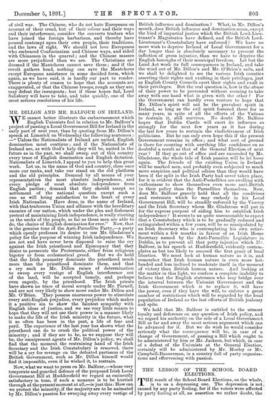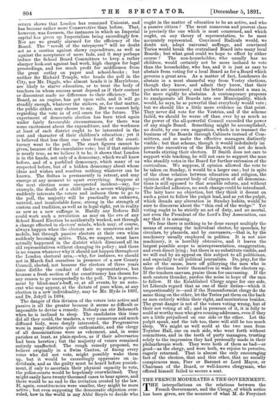THE LESSON OF ' THE SCHOOL BOARD ELECTIONS.
HE result of the School Board Elections, on the whole, T is to us a depressing one. The depression, is not( caused by any party feeling, for if the voters were affected by party feeling at all, an assertion we rather doubt, the return shows that London has remained Unionist, and has become rather more Conservative than before. That, however, was foreseen, the instances in which an Imperial capital has given up Imperialism being exceedingly few. Nor are we greatly alarmed for the efficiency of the Board. The " revolt of the ratepayers " will no doubt act as a caution against showy expenditure, as well as against the acceptance of mere fads, and it may perhaps induce the School Board Committees to keep a rather sharper look-out against bad work, high charges for legal proceedings, and too much profit for middlemen from the great outlay on paper and school-books ; but neither Sir Richard Temple, who heads the poll in the City, nor Mr. Diggle, who almost heads it in Marylebone, are likely to starve education, or to treat the body of teachers on whom success must depend as if their content or discontent made no difference to their efficiency. The Board, as an engine, has got upon rails, and it will go steadily enough, whatever the stokers, or, for that matter, the public either, may choose to say. But we cannot help regarding the vote as of evil omen for the future. The experiment of democratic election has been tried again under fairly favourable circumstances, for there was some excitement about the expenditure, and the workmen at least of each district ought to be interested in the cost and character of their children's education ; yet it is believed that less than one clear fourth of the consti- tuency went to the poll. The exact figures cannot be given, because of the cumulative vote; but if that estimate is nearly true, as we believe it to be, it shows that London is in the hands, not only of a democracy, which we all knew before, and of a purblind democracy, which many of us suspected before, but of a hidden democracy about whose ideas and wishes and resolves nothing whatever can be known. The Sultan is permanently in retreat, and may emerge at any moment to upset everything. Suppose at the next election some unexpected incident—say, for example, the death of a child under a severe whipping— suddenly interests the voters and induces them to go to the poll, the majority will be practically an unknown, untried, and incalculable force, strong in the strength of custom and tradition, as well as in legal right, yet in reality as new as a new suffrage is. Hardly any Reform Bill could work such a revolution as may on the eve of any School Board Election be accidentally worked, not through a change effected in electors' minds, which may, of course, always happen when the electors are so numerous and so mobile, but through passive electors at their own whim suddenly becoming active. This, we suspect, must have actually happened in the district which dismissed all its old representatives without changing its policy ; and there is no reason whatever why it should not happen throughout -the London electoral area,—why, for instance, we should not in March find ourselves in presence of a new County Council, elected, not because the electors of three years since dislike the conduct of their representatives, but because a fresh section of the constituency has chosen for any reason to go unexpectedly to the poll. This is govern- ment by blind-man's-buff, or, at all events, by an auto- crat who may appear, at the dictate of pure whim, at any election in a new individuality, may be Mr. Hyde in 1891, and Dr. Jekyll in 1894. The danger of this division of the voters into active and passive is all the greater because it seems so difficult or impossible to devise a remedy. Nobody can stir Behemoth when he is inclined to sleep. The candidates this time did all they could, the teachers, a very numerous and much diffused body, were deeply interested, the Progressives were in many districts quite enthusiastic, and the clergy of all denominations were as vehement, and, in some parishes at least, as plain-spoken, as if their adversaries had been heretics ; but the majority of voters remained entirely unaffected. The rough remedy proposed, we believe originally in a Swiss Canton, of fining every voter who did not vote, might possibly wake them up, but it would be exceedingly oppressive on in- dividuals, and as the guilty must be heard before punish- ment, if only to ascertain their physical capacity to vote, the police-courts would be hopelessly overwhelmed. They might easily have twenty thousand cases to hear apiece, and there would be no end to the irritation created by the law. If, again, constituencies were smaller, they might be more active ; but even supposing the democratic objection over- ruled, how in the world is any Abb6 Sieyes to decide who ought in the matter of education to be an active, and who a passive citizen ? The most numerous and poorest class is precisely the one which is most concerned, and which ought, on any theory of representation, to be most accurately represented. Convinced Radicals would, we doubt not, adopt universal suffrage, and convinced Tories would break the centralised Board into many local Boards ; but what good could we hope to effect by either course ? The non-householder, who usually has no children, would certainly not be more inclined to vote than the householder, who has, and it is just as easy to abstain from voting for a local Board as for a Board which governs a great area. As a matter of fact, Londoners do abstain in a most shameful way from Vestry elections, though they know, and admit they know, that their pockets are concerned ; and the better educated a man is, the more rigidly he abstains. A contemporary proposes to amalgamate all Boards into one Municipality, which would, he says, be so powerful that everybody would vote ; but we should like a little more evidence on that point. They never did vote for the Vestries, and if the scheme failed, we should be worse off than ever by as much as the power of the all-powerful Council exceeded the power of any single Board. Something might be accomplished, no doubt, by our own suggestion, which is to transact the business of the Boards through Cabinets instead of Com- mittees, and so make the effective managers distinctly visible ; but that scheme, though it would indefinitely im prove the executives of the Boards, would not do much towards stirring their electors. If Smith does not care to support wide teaching, he will not care to support the man who steadily votes in the Board for further extension of the curriculum. We suppose, if opinion allowed the vote to be taken on Sunday, it would be a larger one ; but in spite of the close relation between education and religion, the opinion of the general body of clergymen of all denomina- tions is still opposed to that sensible reform, and without their decided adhesion, no such change could be introduced. The laity have no objection, but they think it decent on such a point to follow the pulpit lead, and as yet the pulpit, which dreads any alteration in Sunday habits, would be sure to discourse about the " thin end of the wedge." Yet voting ought to be strictly an act of duty, and no mortal, not even the President of the Lord's Day Association, can say that it is amusing. We fear there is nothing to be done except multiply the means of arousing the individual elector, by speeches, by circulars, by placards, and by canvassers,—that is, by the machinery usually employed in politics. It is not nice machinery, it is horribly obtrusive, and it leaves the largest possible scope to misrepresentation, exaggeration, and even direct lying ; but there is no substitute visible, and we will end by an appeal on this subject to all politicians, and especially to all political journalists. Do, pray, for the sake of the cause, leave off pillorying the men who in these elections bestir themselves to wake the electors up. If the teachers canvass, praise them for canvassing. If the mob orators thunder, pardon the noise in hope of the rain to follow. If the Established Clergy argue for one side, let Liberals regard that as one of their duties—which it unquestionably is—and if the Nonconformist clergy do the same thing on the other, let the Tories pat them on the back as men entirely within their right, and meritorious besides. The great danger is not of the voters voting wrong, but of their not voting at all; and in presence of it, it is folly to scold at worthy men who give rousing addresses, even if they are a little prejudiced on one side or the other. Let the pulpit speak, and the tub too, there will still be too much sleep. We might as well scold at the two men from Toynbee Hall, one on each side, who went forth without committees, and in the teeth of party managers, trusting solely to the impression they had personally made in their philanthropic work. They were both of them as bad—or good—as the clergy, and were both, we rejoice to perceive, eagerly returned. That is almost the only encouraging fact of the election, that and this other, that no socially conspicuous man, Peer or Baronet or Lord Mayor, or Chairman of the Board, or well-known clergyman, who offered himself failed to secure a seat.



















































 Previous page
Previous page